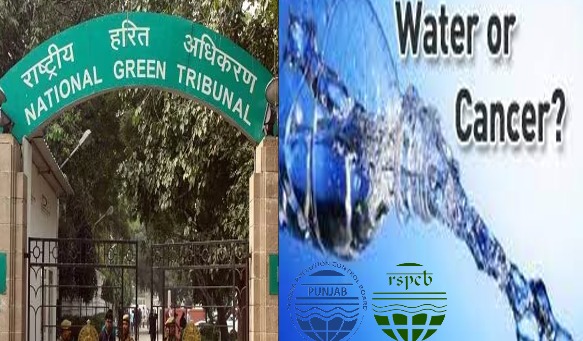
The National Green Tribunal (NGT) has recently ordered the Rajasthan Pollution Control Board (RJSPCB) and the Punjab Pollution Control Board (PPCB) to commission a joint study by the Indian Council of Medical Research (ICMR), New Delhi, or the Indian Toxicological Research Institute (ITRI), Lucknow.
The study’s goal is to investigate the root causes of the rising number of cancer patients in both states, as recommended by the Joint Committee report.
The main bench, comprised of Justice Arun Kumar Tyagi (Judicial Member) and Dr. Afroz Ahmad (Expert Member), heard the application to order the State of Punjab to stop polluting drinking water in the Ganga Canal that flows to Sri Ganganagar, Rajasthan.
According to the application, hundreds of people become ill every day from drinking contaminated water, and certain senior Punjabi government officials are encouraging industry owners to pollute the Gang Canal by doing nothing.
The applicant further claimed that despite the Tribunal issuing numerous warnings in the past, none of them had any effect.
The NGT established a Joint Committee in July 2022 with orders to submit a factual and action-based report on the situation.
According to the Joint Committee’s study, the district of Sri Ganganagar in Rajasthan receives good quality water throughout the year, except in the months of May and June, when the quality of water deteriorates owing to stagnation at the canal’s gates during the canal’s closing period. The report also says that corrective action is being done to resolve this issue.
According to the report on the study of water samples collected at various levels for chemical, bacteriological parameters, and heavy metals from January 2022 to February 2023, no heavy metals were detected, and various metrics were found to be within allowed limits.
The Punjab Pollution Control Board has already identified the sources of pollution that discharge wastewater into drains that flow to rivers, and remedial actions such as the installation of Sewage Treatment Plants (STPs) are being taken.
According to the analysis, incidences of cancer patients in the vicinity cannot be traced to canal water. However, the CPCB has been advised to conduct research through ICMR or another credible agency to analyze the issue further and determine whether any corrective steps are required.
The report further suggested that the Government of Rajasthan ensure that raw water from the canal that reaches the district’s urban and rural areas is subjected to conventional treatment and disinfection before being given to the public for drinkable purposes.
It is also advised that no unauthorized supply of canal water, without the necessary treatment and disinfection, be made available to the public, particularly in rural areas.
In light of the report, the NGT has directed that the necessary corrective actions, as outlined in the Joint Committee’s report, be implemented.
The NGT has also ordered the RJSPCB and PPCB to conduct collaborative research, as recommended in the collaborative Committee’s report, to investigate the root reasons of the growing number of cancer patients in both states. The study will be carried out by either the ICMR in New Delhi or the ITRI in Lucknow.
The NGT also directed that after the study was completed, the Member Secretary of the RSPCB deliver copies of the study report to the Chief Secretaries of the Governments of Rajasthan and Punjab, respectively. In a timely way, the responsible authorities should take suitable measures in accordance with the findings and recommendations contained in the study report. Furthermore, the Member Secretary of the RSPCB and PSPCB should guarantee that a copy of the study report is uploaded to the RSPCB and PSPCB websites.




